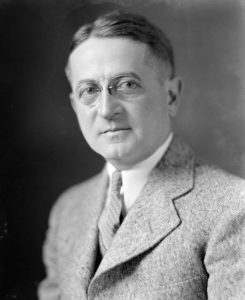(Jan. 15, 1879-Nov. 30, 1959). Morris Feuerlicht was born in Tokay, Hungary, and raised in Chicago and Boston. He graduated from Hebrew Union College of Cincinnati (1897), the University of Cincinnati (1901), and pursued postgraduate studies at the University of Chicago.
In the fall of 1904, Feuerlicht moved from a rabbinate at Lafayette, Indiana, to become the associate rabbi at the . He became rabbi in 1907 and served the congregation until 1946. Feuerlicht married Mildred Mayerstein in 1909.
Feuerlicht was active in education, social, and community service. He worked with Judge of the Marion County Juvenile Court to promote the pioneering system throughout Indiana, which was one of the first in the country. He served for 21 years as president of the Children’s Aid Association (later ), a volunteer auxiliary of the juvenile court. He served on the County Board of Welfare, as president of the Indiana State Conference of Charities, and was the first Jew appointed to the State Board of Charities and Correction (1920-1931).
Feuerlicht cofounded the (1904) and served as the first editor-in-chief of the (1922).
During World War I, he chaired the Jewish Welfare Board, and volunteered for the Relief of Jewish War Sufferers and the American Red Cross. As a Reform Jew, Feuerlicht was committed to social justice, an imperative of prophetic Judaism. In 1911-1912, Feuerlicht helped the community raise matching funds for Julius Rosenwald’s contribution for a new YMCA for the African American community—the Senate Avenue YMCA. During the 1920s, Feuerlicht was the Jewish community’s principal spokesman against the Ku Klux Klan. In 1935, he publicly condemned the Nazi government and appealed to the Indiana Pastors’ Conference to combat Nazi propaganda. During World War II, he conducted religious services for Jewish men and women in army camps. After World War II, Feuerlicht was a staunch critic of political Zionism.
Feuerlicht represented the Jewish community in literary and interfaith circles. He debated attorney Clarence Darrow in 1928 and 1929 before large Indianapolis audiences. He taught Semitics at the School of Religion from 1926 to 1951. He belonged to the and the Indiana Library and Historical Board. He authored the memoir, “A Hoosier Rabbinate,” included in the collection .

Help improve this entry
Contribute information, offer corrections, suggest images.
You can also recommend new entries related to this topic.





